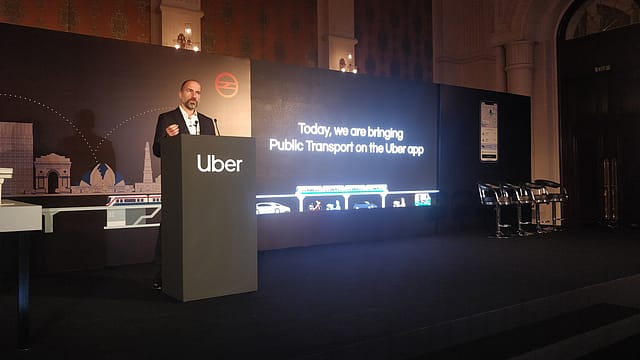Uber launches public transport services in Delhi
ADVERTISEMENT

Delhi will be the first city in Asia to get Uber’s public transport services, CEO Dara Khosrowshahi said on Tuesday.
Looking to ease last-minute connectivity issues, the ride-hailing company has partnered with Delhi Metro Rail Corporation (DMRC) to provide its public mobility services ‘Uber Transit’ across 200 metro stations.
Commuters in Delhi will now have ‘Public Transport’ as an option along with Uber’s existing services like ‘UberGo’ and ‘Pool’. The feature will offer quicker and cheaper routes while integrating real-time metro and bus schedules, and walking directions.
Delhi becomes the ninth city in the world to get this feature after Boston in the U.S., Nice in France, among others. “In our first five cities in the world, half a million users have been using the public transport system in Uber app,” Khosrowshahi said. “The results show that we are bringing new users to Transit … ultimately [leading to] growth of Uber.”
Khosrowshahi said everyone can contribute to making public transit services better. “We’re thrilled to be here. We know that Uber and the cities in which we operate share many of the same goals: reducing congestion, expanding access to transportation and tackling air pollution. With today’s launch we demonstrate one more way Uber is becoming the operating system for everyday life, in India and across the world. ” he said.
Khosrowshahi said that people are moving away from the model of car ownership, which is a “trap that prevents innovation”. “Use of ride-sharing and metro show a change in market trends with consumers,” he added.
Uber said that UberMoto and UberAuto are some of the biggest innovations in terms of products built with an India focus. With its latest move, the company says it aims to make every leg of the journey seamless.
“Partnering with companies will enable first and last-mile connectivity. DMRC enables 25 million trips daily, and users would need a similarly smooth experience outside of the metro,” Mangu Singh, managing director, DMRC said.
Uber said that India is a huge opportunity to make sure its cities are built for people and not for cars. It plans to have dedicated pickup spots at metro stations, charging stations for electric vehicles, self-driving cars and bikes, and vehicles for the physically disabled in the future.